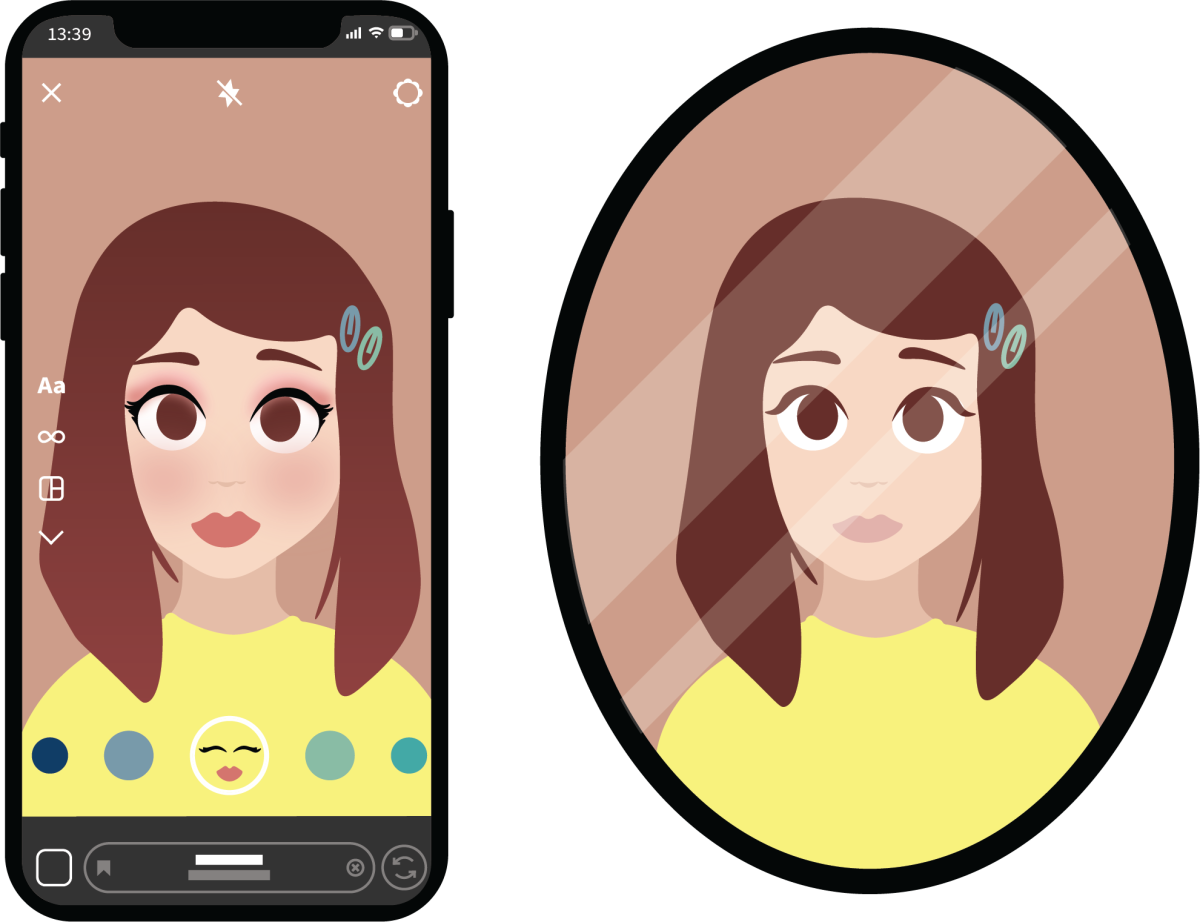“What does it mean that, having been part of the internet for so long, the internet is also a part of me?” John Green in The Anthropocene Reviewed.
Today’s quad looks vastly different than it did twenty years ago. Students walk with their faces buried in their phones, work on MacBooks rather than notebooks and film TikToks in the school bathrooms. The prevalence of social media and the internet is relatively new, so teenagers should be wary of the possible unintended consequences of living their lives on the internet. These apps are using us just as much as we are using them, affecting us in ways we often don’t realize.
To observe this effect, look no further than “Sephora preteens,” the recent phenomenon of young girls ages 10-13 taking over makeup stores such as Sephora due to being influenced by older content creators on social media. Senior Claire Pankros believes this push to look and act older robs preteens of important childhood experiences.
“There’s this need to grow up faster in order to fit with what’s trending,” Pankros said. “You don’t really realize what you’re missing out on until you’re older.”
Social media’s influence over what we purchase, listen to, and how we act goes beyond limiting the carefree nature of childhood. It also creates a lack of individualism in its users, especially in impressionable teenagers who are still figuring out their identity. Psychology teacher Michael Brown agrees that seeking online attention can cause people to lose sight of themselves.
“If I’m getting that dopamine hit every time somebody likes something of mine, naturally, I’m going to want to do it more,” psychology teacher Michael Brown said. “…[Social media] has us chasing this facade of a human rather than an actual human. It feels like everyone’s forced into wearing a mask.”
Social media platforms push users to fit with what’s trending, which can sometimes cause us to be more cautious, choosing hobbies based on whether or not they’ll look aesthetic on Instagram. We’re not just curating our feeds, we’re curating our personalities.
In the podcast, “The Random Show” by Tim Ferriss, he brings up the concept of “personality by consensus,” the idea that social media acts as a feedback loop, with users sharing content and altering themselves depending on how many likes and comments it gets.
“Just look at personalities online over time who spend a lot of time on social media… they have certain behaviors rewarded, certain behaviors punished, certain behaviors left unapplauded,” Ferriss said in episode #493 of his podcast. “They start to warp and bend their behavior to fit the most applause…And I think that that ends up inevitably bleeding over into their real lives.”
Social media’s influence doesn’t just alter how we present ourselves to the world, it also shapes our internal world view. A study published in the scientific journal, Psychology of Popular Media, “Empathy, Narcissism, Alexithymia, and Social Media Use,” showed increased social media use correlated with lowered empathy and higher narcissism and alexithymia, which is classified as difficulty feeling and identifying emotions. Brown agrees that the internet tends to amplify whatever internal struggles a person is prone to.
“[Social media] feels like it’s a stimulus,” Brown said. “It takes whatever you might have issues with and just gas pedals, and hits you all the harder.”
Along with encouraging personality disorders, the internet also strips teenagers of the right to forget their mistakes. You’re probably not the same person you were when you were 13, but when that version of you is forever immortalized on the internet, it’s harder to escape. The digital footprint is easily traceable; Generation Z is essentially walking through wet concrete with every like, comment and post.
“The Internet…tends to scale up mistakes to monumental proportions, and to put them on our permanent records,” writes Nausicaa Renner in a New Yorker article. “Colleges and employers now look at social media accounts for evidence of character… What is it like to live under threat? What are the ramifications when an entire generation never gets the chance to experiment freely or to remake themselves?”
A 2023 survey by Gallup reveals that teenagers spend an average of 4.8 hours per day on social media and a 2023 study conducted by Cross River Therapy found that around 70% of teenagers and young adults in the U.S. are addicted to social media. We are the first generation to grow up with the internet at our fingertips, and as these statistics display, we haven’t yet figured out how to handle its power without letting it consume us.
Social media influences our choices and shapes our identities, which leaves us with the terrifying question: what is left of us as individuals? We must figure out how to navigate the modern world of social media while retaining our sense of self.










